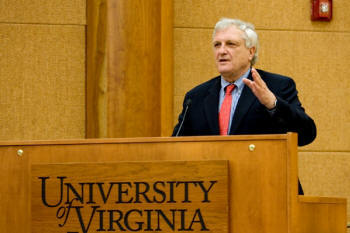A Successful Launch of UVA's Center for German Studies

The Center for German Studies at UVa (CGS) was launched on October 24-25th, 2008. Showcasing the Center's interdisciplinary ambitions, the launching was a real success, with good attendance and powerful endorsements by Dr. Josef Joffe, editor-in-chief of Germany's leading weekly Die Zeit, and Prof. Meredith Jung-En Woo, the Dean of UVa's College of Arts and Sciences. Dr. Joffe gave a public lecture on transatlantic relations and participated in two roundtables as well as in two receptions and dinners. These activities brought together deans, professors, students, representatives from the embassies of German-speaking countries, and the broader UVa community.
The launching event opened with a formal address by Prof. Volker Kaiser, the Center's current Director, followed by a Roundtable on Religion and Politics. Dr. Joffe discussed the contrasting roles of faith in American vs. European society, emphasizing the supply side. According to his analysis, low entry barriers for churches in the U.S. stimulate a differentiated type of religiosity, as opposed to the centralized and far less dynamic religious landscape in Europe. Colleagues from Political Science, Religious Studies and Sociology then responded to Joffe, pointing to the potential divisiveness of religion and the increasing religious diversity in Europe. A rich debate ensued. The roundtable illustrated forcefully the strength of the CGS' multi-disciplinary approach. On Saturday we had a more intimate discussion about the Future of German Studies, in which a fair number of UVa's students participated. During this session, we saw another side of Dr. Joffe, namely that of cultural ambassador. Dr. Joffe emphasized the importance of an open approach to German Studies with an eye for the many aspects of the German-speaking and European societies. The very-well prepared UVa students offered their own perspective. They emphasized that while German-speaking ancestry can be an inspiration, their interest in German Studies goes far beyond these personal connections. The highpoint of the launching was, of course, Dr. Joffe's public lecture on Transatlantic Relations. In the heat of the pre-election debate, Joffe, an expert in international relations, chose to analyze the favorable perception of Barack Obama in Europe. While he predicted that Obama would win the election, Joffe also delivered some provocative thoughts. Yes, Joffe argued, Europe sees Candidate Obama as at least potentially "one of us". According to Joffe, Europe was likely to be disappointed by President Obama, however. The underlying U.S. interests would ultimately determine the course of an Obama administration. This position triggered an engaging debate that Dr. Joffe led himself. The discussion confirmed one of the Center's major premises: that transatlantic relations should remain open and inspiring.